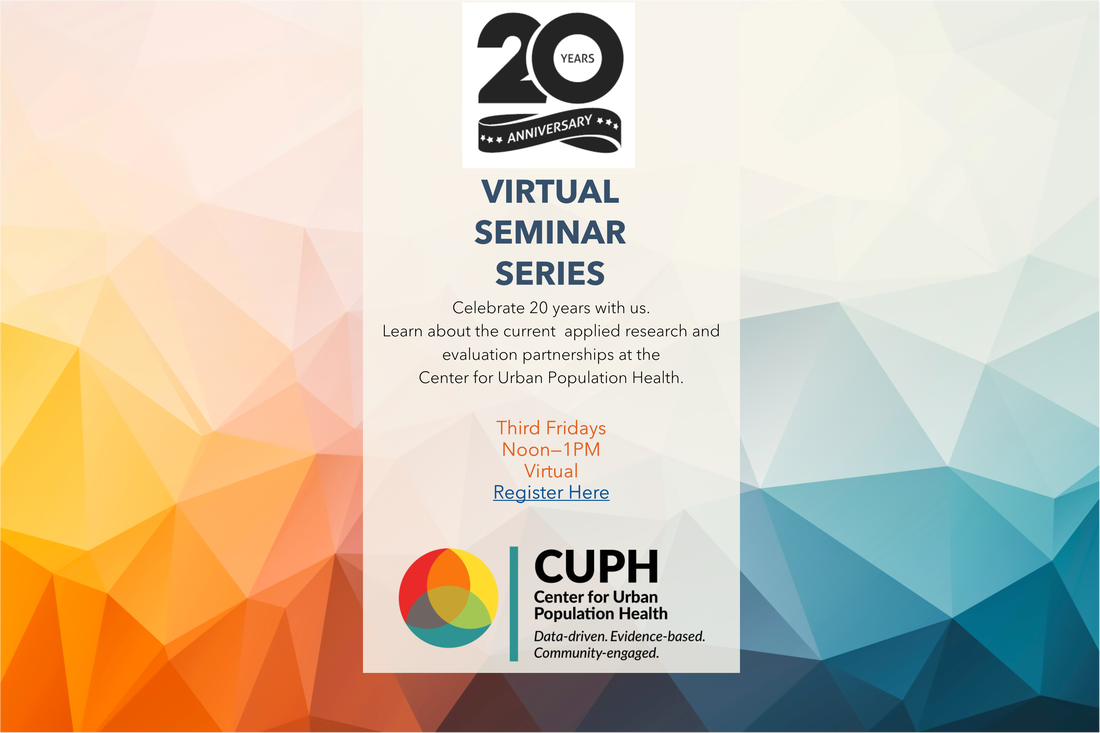|
We are excited to celebrate our 20th anniversary with you. All year we will be highlighting our work and our partnerships through this monthly seminar series. If you can't make it one month, we will archive the seminar here each month.
When: Third Friday's from Noon to 1 pm Where: Virtual. |
Find session descriptions and archived video and slides below.
October 15: The Milwaukee Partnership Research Study: Moving from Vision to Reality
Elizabeth Duthie, Rachel Lander, and Kaija Zusevics will present findings from their study that began with the research question: what are challenges and catalysts to moving an aim forward? They will highlight two academic fields of study that provided the foundation for this research: implementation science and meeting science. Extensive analysis of the data revealed that the key to moving the aim forward was utilizing a systematic process during meetings to keep the meetings concrete and actionable. The systematic process included: defining the aim, determining baseline data, creating a scope of work that was manageable, measuring progress toward the aim, engaging implementors’ buy-in, and establishing concrete and actionable steps to move the aim forward. Further, they found that a set of meeting tools provided a structure for keeping meetings concrete and actionable. In this presentation, they will share the findings of their research study: they have created a replicable process – one that is observable, measurable, and teachable – that can help organizations and coalitions implement their initiatives and reach their goals.
Elizabeth Duthie, Rachel Lander, and Kaija Zusevics will present findings from their study that began with the research question: what are challenges and catalysts to moving an aim forward? They will highlight two academic fields of study that provided the foundation for this research: implementation science and meeting science. Extensive analysis of the data revealed that the key to moving the aim forward was utilizing a systematic process during meetings to keep the meetings concrete and actionable. The systematic process included: defining the aim, determining baseline data, creating a scope of work that was manageable, measuring progress toward the aim, engaging implementors’ buy-in, and establishing concrete and actionable steps to move the aim forward. Further, they found that a set of meeting tools provided a structure for keeping meetings concrete and actionable. In this presentation, they will share the findings of their research study: they have created a replicable process – one that is observable, measurable, and teachable – that can help organizations and coalitions implement their initiatives and reach their goals.
November 19: Wisconsin’s Collaborative Approach to Increase Colorectal Cancer Screening: Where public health meets primary care Allison Antoine and Michelle Corbett will present a review of the five-year, CDC-funded Colorectal Cancer Control Program that took place from 2015-2020. Designed to address racial and ethnic disparities in colorectal cancer screening, the project partnered with Federally Qualified Health Centers. Allison and Michelle will highlight the project’s programmatic and evaluation purpose, goals, and strategies, share process and outcome findings, and discuss lessons learned. They will be joined by two project partners: Sarah Francois (Progressive Community Health Centers) and Janet Malmon (Outreach Community Health Centers). Sarah and Janet will share details of their organizations’ efforts to improve colorectal cancer screening rates and their perspectives on how this partnership contributed to their organizations’ outcomes.
December 17: Youth E-Cigarette Use in Wisconsin
This project is directed by Karen Palmersheim, PhD (principal investigator and epidemiologist) in partnership with the WI Department of Health Services. Demographic, psychosocial, and health-related factors will be highlighted.
This project is directed by Karen Palmersheim, PhD (principal investigator and epidemiologist) in partnership with the WI Department of Health Services. Demographic, psychosocial, and health-related factors will be highlighted.
January 21: TANF AODA Grant Evaluation: Using Data to Improve Substance Use Disorder Treatment for Low-Income Parents
Michelle Bunyer and Michelle Corbett will present information from their work with the Milwaukee County Behavioral Health Division (BHD) supporting implementation of the Temporary Assistance for Needy Families Alcohol and Other Drug Abuse (TANF AODA) grant. Awarded in 2017 by the State of Wisconsin Department of Health Services to BHD, this grant funds outreach, treatment, and recovery support services for low-income parents with a substance use disorder and who have minor children living in Milwaukee County. Michelle and Michelle will share how they cultivated strong relationships with the BHD grant team and helped build the team’s capacity to practice data-driven decision-making. As well, they will discuss how they navigated their role as external evaluators for a community partner with an existing internal evaluation team.
Michelle Bunyer and Michelle Corbett will present information from their work with the Milwaukee County Behavioral Health Division (BHD) supporting implementation of the Temporary Assistance for Needy Families Alcohol and Other Drug Abuse (TANF AODA) grant. Awarded in 2017 by the State of Wisconsin Department of Health Services to BHD, this grant funds outreach, treatment, and recovery support services for low-income parents with a substance use disorder and who have minor children living in Milwaukee County. Michelle and Michelle will share how they cultivated strong relationships with the BHD grant team and helped build the team’s capacity to practice data-driven decision-making. As well, they will discuss how they navigated their role as external evaluators for a community partner with an existing internal evaluation team.
February 18: Top Health Needs in Milwaukee: The Milwaukee Health Care Partnership Joint Community Health Needs Assessment
The Milwaukee Health Care Partnership (MHCP), on behalf Milwaukee’s four health systems – Advocate Aurora Health, Ascension Wisconsin, Children’s Wisconsin, and Froedtert Health - announced the release of the 2021 Milwaukee County Community Health Needs Assessment (CHNA) revealing mental health, violence, drug use and overdose, alcohol use and access to health care as top health issues. Justin Rivas from the MHCP shares the process and outcomes from this year's assessment.
The Milwaukee Health Care Partnership (MHCP), on behalf Milwaukee’s four health systems – Advocate Aurora Health, Ascension Wisconsin, Children’s Wisconsin, and Froedtert Health - announced the release of the 2021 Milwaukee County Community Health Needs Assessment (CHNA) revealing mental health, violence, drug use and overdose, alcohol use and access to health care as top health issues. Justin Rivas from the MHCP shares the process and outcomes from this year's assessment.
March 18: SHOW: the Survey of the Health of Wisconsin in Milwaukee
April 15: Improving Children's Mental Health Through School and Community: Looking Back and Moving Forward in Racine
The presentation will describe this 8-year project in Racine that aims to improve the social emotional health of children. We will briefly outline the funding mechanism and structure, detail our 4 main strategies, and highlight our plans for sustainability. Our presentation will also include discussion on the collaborative role between the project manager and the evaluators that supported the use of data-driven decision making and strategic planning in each strategy.
The presentation will describe this 8-year project in Racine that aims to improve the social emotional health of children. We will briefly outline the funding mechanism and structure, detail our 4 main strategies, and highlight our plans for sustainability. Our presentation will also include discussion on the collaborative role between the project manager and the evaluators that supported the use of data-driven decision making and strategic planning in each strategy.
May 20: From Inkling to Evidence: Filling the Hmong Data Gap through a Behavioral Health Needs Assessment
Michelle Corbett and partners from the Hmong American Friendship Association, Lo Neng Kiatoukaysy, Lang Xiong, and Sandra Christensen, will present on a statewide behavioral health needs assessment conducted in 2021. They will discuss the why behind the assessment, describe how it was carried out, and share key findings and how they have been used so far. They will also reflect on this first-time partnership and lessons learned.
Michelle Corbett and partners from the Hmong American Friendship Association, Lo Neng Kiatoukaysy, Lang Xiong, and Sandra Christensen, will present on a statewide behavioral health needs assessment conducted in 2021. They will discuss the why behind the assessment, describe how it was carried out, and share key findings and how they have been used so far. They will also reflect on this first-time partnership and lessons learned.
June 17: Promoting Best Practices in Substance Use Prevention and Treatment in Wisconsin Bernestine Jeffers, Elizabeth Duthie and the team will present current substance use issues facing Wisconsin and the unique partnerships they have created to meet the training needs of providers and stakeholders. They will discuss their approach and highlight the successful Opioid, Stimulant and Trauma Summit recently held in La Crosse, WI.
July 15: Social Determinants of Health Navigation in a Health Care Setting
The project, initiated in 2019, aims to gain a deeper understanding of the socio-economic factors, such as housing insecurity, that influence health on the south side of Milwaukee. The process of implementing universal screening for social needs among primary care patients at Sixteenth Street Community Health Centers has been used to develop a collaborative model for health care and social service delivery to close these health gaps and improve health outcomes for patients. CUPH's Michelle Corbett, Academic Partner and Lead Evaluator, presents with Rosamaria Martinez, Vice President of Community Health Initiatives, and Anna Klonowski, SDoH Integration and Outreach Manager, from Sixteenth Street Community Health Centers. This presentation shares information about the purpose and goals of the project, the screening and referral model implemented in primary care settings with over 5,300 patients to date, the evaluation approach, some initial findings from the first 3.5 years of the project, and ideas for the future.
The project, initiated in 2019, aims to gain a deeper understanding of the socio-economic factors, such as housing insecurity, that influence health on the south side of Milwaukee. The process of implementing universal screening for social needs among primary care patients at Sixteenth Street Community Health Centers has been used to develop a collaborative model for health care and social service delivery to close these health gaps and improve health outcomes for patients. CUPH's Michelle Corbett, Academic Partner and Lead Evaluator, presents with Rosamaria Martinez, Vice President of Community Health Initiatives, and Anna Klonowski, SDoH Integration and Outreach Manager, from Sixteenth Street Community Health Centers. This presentation shares information about the purpose and goals of the project, the screening and referral model implemented in primary care settings with over 5,300 patients to date, the evaluation approach, some initial findings from the first 3.5 years of the project, and ideas for the future.

